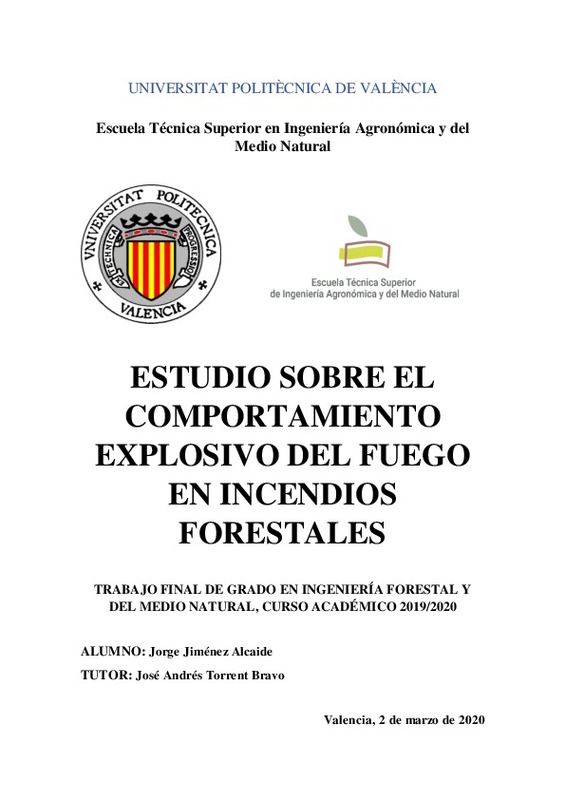JavaScript is disabled for your browser. Some features of this site may not work without it.
Buscar en RiuNet
Listar
Mi cuenta
Estadísticas
Ayuda RiuNet
Admin. UPV
Estudio sobre el comportamiento explosivo del fuego en incendios forestales
Mostrar el registro sencillo del ítem
Ficheros en el ítem
| dc.contributor.advisor | Torrent Bravo, José Andrés
|
es_ES |
| dc.contributor.author | Jiménez Alcaide, Jorge
|
es_ES |
| dc.date.accessioned | 2020-05-05T23:02:56Z | |
| dc.date.available | 2020-05-05T23:02:56Z | |
| dc.date.created | 2020-03-26 | |
| dc.date.issued | 2020-05-06 | es_ES |
| dc.identifier.uri | http://hdl.handle.net/10251/142474 | |
| dc.description.abstract | [ES] En pleno siglo XXI, a pesar de los avances exponenciales en ciencia e investigación, aún existen fenómenos naturales que el ser humano no ha llegado a comprender. Uno de ellos es el comportamiento explosivo del fuego en incendios forestales. Este comportamiento es muy similar al que pueden tenerlos ya estudiados “backdraft” y “flashover”, y que ocurren en incendios de interior. Según diversos estudios, cuando se dan determinadas condiciones en el medio natural (tanto climáticas, topográficas, modelo de combustible vegetal, etcétera), un frente de fuego puede llegar a avanzar a más de 120 kilómetros por hora. Son muchos los casos y testimonios, varios de ellos expuestos en este trabajo, los que evidencian la existencia de este tipo de fenómeno. Lamentablemente, tras él se esconde un número alarmante de víctimas mortales ya que este avance tan rápido y repentino de las llamas suele sorprender a los equipos de extinción. Son varias las corrientes de investigación que tratan de sentar bases en un tema tan delicado como este, pero sin llegar a las mismas conclusiones. Existen contradicciones entre las diferentes teorías, y la ciencia oficial está lejos de llegar a un consenso.Por tanto, en el presente estudio se analizan los procesos que rigen el desarrollo de estos fenómenos deflagrantes, en base a las corrientes de investigación existentes y a diversos sucesos reales que se han documentado. Mediante el análisis de esta información se pretende llegar a una conclusión propia acerca del fenómeno, además de establecer mecanismos de prevención. Es evidente que estos sucesos no pueden ser erradicados, pero sí mitigar sus consecuencias y tratar de establecer las condiciones en las que ocurren para poder detectarlos a tiempo. | es_ES |
| dc.description.abstract | [EN] In the 21st century, despite all exponential advances in science and research, there are still natural phenomen that human beings have not come to understand. On of them is the explosive behavour of fire in wildfire. This behaviour is very similar to those already studied backdraft and flashover, that occur in indoor fires and which the activity teams are very prepared. According to some studies and researches, when there are critical conditions (both climatic conditions, topography, fuel modelo f vegetation, etc.) a fire front can reach more than 120 kilometers per hour. There are many cases and testimonies, some of them exposed in this research, which shows the existence of this type of phenomenon. Unfortunately, behind him hides an alarming number of fatalities due to this rapid rate of speed and regretting the flames often surprise firefighters. There are several stream of research that try to lay the groundwork on a subject as sensitive of this deflagrant phenomenon, but without reaching the same conclussions. There are contradictions between different theories, and oficial science is far from reaching a consensus. Therefore, the objective of the study is to evaluate currently existing theories and apply them to cases founded development of this blowup fires, based on established theories and some fatalities that have been documented. It¿s intended to evaluate the meaning of these theories is better focused on explain the phenomenon, in addition to establish bases for its prevention. It¿s evident that such a phenomenon cannot be eradicated, but it¿s posible mitigate his consequences and try to explain the contitions in which happen in order to prevent it on time. | es_ES |
| dc.language | Español | es_ES |
| dc.publisher | Universitat Politècnica de València | es_ES |
| dc.rights | Reserva de todos los derechos | es_ES |
| dc.subject | Incendios forestales | es_ES |
| dc.subject | Comportamiento del fuego | es_ES |
| dc.subject | Prevención de incendios | es_ES |
| dc.subject | Extinción de incendios | es_ES |
| dc.subject | Fenómenos deflagrantes | es_ES |
| dc.subject | Forest fires | es_ES |
| dc.subject | Fire behaviour | es_ES |
| dc.subject | Forest fire management | es_ES |
| dc.subject | Fire blowup | es_ES |
| dc.subject | Fire fighting | es_ES |
| dc.subject | Fire prevention | es_ES |
| dc.subject | Fire spread | es_ES |
| dc.subject | Deflagrating phenomena | es_ES |
| dc.subject.classification | INGENIERIA HIDRAULICA | es_ES |
| dc.subject.other | Grado en Ingeniería Forestal y del Medio Natural-Grau en Enginyeria Forestal i del Medi Natural | es_ES |
| dc.title | Estudio sobre el comportamiento explosivo del fuego en incendios forestales | es_ES |
| dc.type | Proyecto/Trabajo fin de carrera/grado | es_ES |
| dc.rights.accessRights | Abierto | es_ES |
| dc.contributor.affiliation | Universitat Politècnica de València. Departamento de Ingeniería Hidráulica y Medio Ambiente - Departament d'Enginyeria Hidràulica i Medi Ambient | es_ES |
| dc.contributor.affiliation | Universitat Politècnica de València. Escuela Técnica Superior de Ingeniería Agronómica y del Medio Natural - Escola Tècnica Superior d'Enginyeria Agronòmica i del Medi Natural | es_ES |
| dc.description.bibliographicCitation | Jiménez Alcaide, J. (2020). Estudio sobre el comportamiento explosivo del fuego en incendios forestales. http://hdl.handle.net/10251/142474 | es_ES |
| dc.description.accrualMethod | TFGM | es_ES |
| dc.relation.pasarela | TFGM\121953 | es_ES |
Este ítem aparece en la(s) siguiente(s) colección(ones)
-
ETSIAMN - Trabajos académicos [3541]
Escuela Técnica Superior de Ingeniería Agronómica y del Medio Natural







